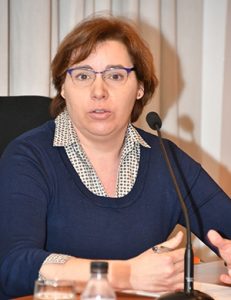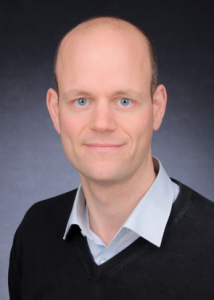
Prof. Martin Schoeberl
Open-Source Research on Time-predictable Computer Architecture
Abstract
Real-time systems need time-predictable computers to be able to guarantee that computation can be performed within a given deadline.
For worst-case execution time analysis we need detailed knowledge
of the processor and memory architecture. Providing the design of a processor in open-source enables the development of worst-cease execution time analysis tools without the unsafe reverse engineering of processor architectures. Open-source software is currently the basis of many Internet services, e.g., an Apache web server running on top of Linux with a web application written in Java. Furthermore, for most programming languages in use today, there are a open-source compilers available. However, hardware designs are seldom published in open-source. Furthermore, many artifacts developed in research, especially hardware designs, are not published in open-source. The two main arguments formulated against publishing research in open source are:
(1) “When I publish my source before the paper gets accepted, someone may steal my ideas” and
(2) “My code is not pretty enough to publish it, I first need to clean it up (which seldom happens)”.
In this paper and in the presentation I will give counterarguments for those two issues. I will present the successful T-CREST/Patmos research project, where almost all artifacts have been developed in open-source from day one. Furthermore, I will present experiences using the Google/Skywater open-source
tool flow to produce a Patmos chip with 12 students within a one semester course.
Prof. Martin Schoeberl received his PhD from the Vienna University of Technology in 2005. From 2005 to 2010 he has been Assistant Professor at the Institute of Computer Engineering. He is now Professor at the Technical University of Denmark. His research interest is on hard real-time systems, time-predictable computer architecture, and real-time Java. Martin Schoeberl has been involved in a number of national and international research projects: JEOPARD, CJ4ES, T-CREST, RTEMP, the TACLe COST action, and PREDICT. He has been the technical lead of the EC funded project T-CREST. He has more than 100 publications in peer reviewed journals, conferences, and books.
Google Scholar profile: https://scholar.google.com/citations?user=bjGw_5QAAAAJ&hl=en&oi=ao

Prof. Helena Holmström Olsson
From Traditional to Digital: How software, data and AI are transforming the embedded systems industry
Abstract
With digitalization and with technologies such as software, data, and artificial intelligence, companies in the embedded systems domain are experiencing a rapid transformation of their conventional businesses. While the physical products and associated product sales provide the core revenue, these are increasingly being complemented with service offerings, new data-driven services, and digital products that allow for continuous value creation and delivery to customers. This talk explores the difference between what constitutes a traditional and a digital company and details the typical evolution path embedded systems companies take when transitioning towards becoming digital companies. The talk focuses on the changes associated with business models, ways-of-working and ecosystem engagements and provides concrete examples based on action-oriented research conducted in close collaboration with companies in the embedded systems domain.
Prof. Helena Holmström Olsson is a Professor in Computer Science at the Department of Computer Science and Media Technology at Malmö University, Sweden, and a senior researcher in Software Center (https://www.software-center.se). She received her Ph.D. in Informatics from University of Gothenburg in 2004 and did her Post doc in LERO (‘The Irish Software Research Center’) at University of Limerick, Ireland. Her research is conducted in close collaboration with industry and primarily with software-intensive companies in the embedded systems domain. Her research interests include engineering aspects of AI systems, data driven development practices, data management, digital transformation and software and business ecosystems. Her research is published in e.g. Journal of Software Maintenance and Evolution, IEEE Software, Information and Software Technology, International Conference on Software Engineering (ICSE), Software Engineering Advanced Applications (SEAA), International Conference on the Quality of Information and Communications Technology (QUATIC), Asia-Pacific Software Engineering Conference (APSEC). In addition, she has published in Information Systems venues, such as, e.g., MIS Quarterly, Information Systems Management and International Conference on Information Systems (ICIS). Helena is a fellow member of the International Software Product Management Association (ISPMA) and a board member of Malmö University, Sweden. Contact: helena.holmstrom.olsson@mau.se
Google Scholar profile: https://scholar.google.com/citations?user=bjGw_5QAAAAJ&hl=en&oi=ao

Prof. Marisa López-Vallejo
Looking for the limits of electronics for autonomous microsystems
Abstract
Autonomous microsystems are microscale systems that do not need external power to operate and communicate for a given period of time. If we can build autonomous microsystems even with dimensions as small as the diameter of a human hair (< 100 μm) new use cases for sensing applications could be addressed. For example, microsensors could be embedded into fibers to produce smart clothing, new approaches to in-vitro and in-body sensing could be performed, etc. This keynote will address the challenges that electronic circuits must meet to be part of and support the design and integration of autonomous microsystems.
Prof. Marisa López-Vallejo received the M.S. and Ph.D. degrees from the Universidad Politécnica de Madrid, Madrid, Spain, in 1993 and 1999, respectively. Since 2016 she is Full Professor with the Department of Electronic Engineering, Universidad Politécnica de Madrid. She was before with Lucent Technologies, Bell Laboratories, Murray Hill, NJ, USA, as a Member of the Technical Staff. During academic year 2015-2016 she was visiting professor at the Microsystems Technology Lab, MIT, USA. Her research interests include low-power, radiation and PVT-aware design, computer-aided diagnostic methods and tools, and application-specific high-performance programmable architectures. Last decade she has focused her research on the reliability of CMOS circuits and memristive memories as well as on new architectures to support reliable design beyond 20nm. She has been coordinator of a set of national and international (EU) projects on these areas. She has supervised 10 PhD theses and has published more than 100 papers in journals and conferences in the field.
Google Scholar profile: https://scholar.google.es/citations?user=NCFpNjsAAAAJ&hl=es

Dr. Heiko Koziolek
Software Architecture Challenges in Industrial Process Automation: from Code Generation to Cloud-native Service Orchestration
Abstract
Large, distributed software systems with integrated embedded systems support production plant operators in controlling and supervising complex industrial processes, such as power generation, chemical refinement, or paper production. With several million lines of code these Operational Technology (OT) systems grow continuously more complex, while customers increasingly expect a higher degree of automation, easier customization, and faster time-to-market for new features. This has led to an ongoing adoption of modern Information Technology (IT) reference software architectures and approaches, e.g., middlewares, model-based development, and microservices. This talk presents illustrative examples of this trend from technology transfer projects at ABB Research, highlighting open issues and research challenges. These include information modeling in M2M middlewares for plug-and-play functionality, code generation from engineering requirements to speed up customization, as well as online updates of containerized control software on virtualized infrastructures.
Dr.-Ing. Heiko Koziolek is Senior Principal Scientist for software architecture at ABB Research in Ladenburg, Germany. After obtaining a PhD in software engineering in 2008, he has been leading research projects on software architectures and technologies for industrial process control and consults ABB software development units for the design of large-scale software systems. His research is concerned with predicting software performance and analyzing software maintainability, specifically in applied research projects connected to product development. He received Most Influential Paper awards of the Elsevier Journal of Systems and Software (2019) and the IEEE International Conference on Software Architecture (2021). He is co-author of the book “Modeling and Simulating Software Architecture”, published by MIT Press in 2016. His professional activities include serving as Associate Editor at Elsevier’s Journal of Systems and Software as well as being program committee member of ICSA, ECSA, SEAA, and ICSE. He is a former member of the German “Plattform Industrie 4.0” and an active member of the Open Group’s “Open Process Automation Forum” and the German Computer Science Society.
Google Scholar profile: https://scholar.google.com/citations?user=MBmb0TkAAAAJ&hl=es

Dr. Arne Hamann
Designing Reliable Distributed Systems
Abstract
Software is disrupting one industry after another. Currently, the automotive industry is under pressure to innovate in the area of software. New, innovative approaches to vehicles and their HW/SW architectures are required and are currently subsumed under the term “SW-defined vehicle”. However, this trend does not stop at the vehicle boundaries, but also includes communication with off-board edge and cloud services. Thinking it through further, this leads to a breakthrough technology we call “Reliable Distributed Systems”, which enables the operation of vehicles where time and safety-critical sensing and computing tasks are no longer tied to the vehicle, but can be shifted into an edge-cloud continuum. This allows a variety of novel applications and functional improvements but also has a tremendous impact on automotive HW/SW architectures and the value chain. Reliable distributed systems are not limited to automotive use cases. The ubiquitous and reliable availability of distributed computing and sensing in real-time enable novel applications and system architectures in a variety of domains: from industrial automation over building automation to consumer robotics. However, designing reliable distributed systems raises several issues and poses new challenges for edge and cloud computing stacks as well as electronic design automation.
Dr. Arne Hamann obtained his PhD in Computer Science in 2008 from the Technical University of Braunschweig Germany. He is Chief Expert for “Distributed Intelligent Systems” at Bosch Research. Like the Bosch product portfolios his range of actives is very broad encompassing complex embedded systems where the interaction between physical processes hardware and software plays a major role through to distributed IoT systems with elements of (edge) cloud computing. In the academic contexts he is member of the editorial board of the ACM journal “Transactions on Cyber Physical Systems” and regularly serves as program committee member for international conferences such as ECRTS, RTSS, RTAS, DAC, WFCS, ETFA, and ICCPS..
Link to Bosch research profile: https://www.bosch.com/research/know-how/research-experts/arne-hamann/
